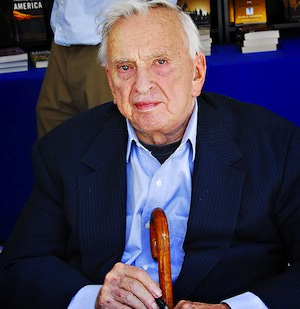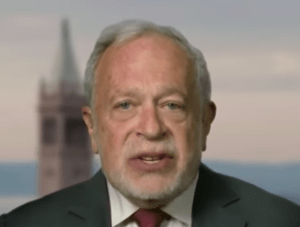The Roots of Gore Vidal’s Discontent
Gore Vidal, the high-born author and activist who died Tuesday at the age of 86, was a man who had grand, democratic ambitions for his country -- a nation that became a pale, mocking imitation of the place he knew during his pre-World War II boyhood -- says his longtime friend Bob Carr, the current Australian minister of foreign affairs.
Gore Vidal, the high-born author and activist who died Tuesday at the age of 86, was a man who had grand, democratic ambitions for his country — a nation that became a pale, mocking imitation of the place he knew during his pre-World War II boyhood — says his longtime friend Bob Carr, the current Australian minister of foreign affairs.
In an interview with Australia’s ABC News the day after Vidal’s death, Carr offers further insight into the personal and historical origins of Vidal’s disappointment with an increasingly imperialized United States.
— Posted by Alexander Reed Kelly.
Your support is crucial…ABC News:
TONY JONES: He went to his grave pretty much convinced that America’s time had passed, that the political system was as bankrupt as the economy and that both were headed for imminent collapse. Where did his deep cynicism about the American experiment come from?
BOB CARR: Well he was deeply rooted in the old Washington, the sleepy pre-World War II Washington, a city described as being equatorial, African, its big African-American population, and a city where power was pretty intimate, where he as a boy in the 1920s was able to wander in his swimming costume onto the floor of the Senate to talk to his legendary grandfather, Senator Gore from Oklahoma, a blind senator to whom young Gore would read.
He’d read “The Decline and Fall of the Roman Empire” and other heavy tomes and that was his political education. And as he saw it, America has been in a long decline since it inherited imperial responsibilities after World War II. He was an isolationist to his bootstraps, someone who in the tradition of Mark Twain and others opposed the notion of American empire, and he saw that as inevitably resulting in a decline of American democracy.
Just as the Roman empire collapsed under the strain of attempting to govern the known world, so he thought the American empire was headed for collapse. America would cease to be a republic as Rome ceased to be a republic under the strains of overseas conquest.
With an uncertain future and a new administration casting doubt on press freedoms, the danger is clear: The truth is at risk.
Now is the time to give. Your tax-deductible support allows us to dig deeper, delivering fearless investigative reporting and analysis that exposes what’s really happening — without compromise.
Stand with our courageous journalists. Donate today to protect a free press, uphold democracy and unearth untold stories.






You need to be a supporter to comment.
There are currently no responses to this article.
Be the first to respond.